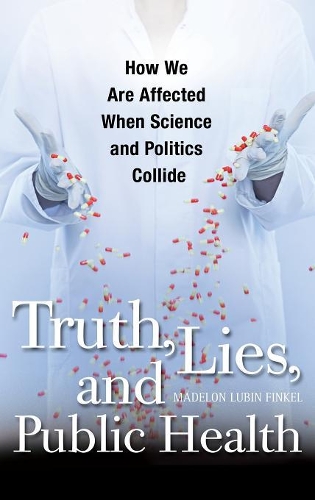
Truth, Lies, and Public Health: How We Are Affected When Science and Politics Collide
(Hardback)
Publishing Details
Truth, Lies, and Public Health: How We Are Affected When Science and Politics Collide
By (Author) Madelon L. Finkel
Bloomsbury Publishing PLC
Praeger Publishers Inc
1st August 2007
United States
Classifications
General
Non Fiction
Science: general issues
362.10973
Physical Properties
Hardback
256
Description
The politicalization of research findings has become prevalent over the past two decades. Politics often prevents the implementation of policy supported by irrefutable science. Most of us understand something about how this is happening with stem cell research, but Cornell's Madelon Finkel delves deep into the subject to make the issues clear, also revealing how ideology and politics are distorting, diminishing and destroying scientific research results regarding topics from needle exchange, HIV/AIDS prevention and medical marijuana to antiobiotic use with animals later marketed for human consumption. When ideologywhether it is the ideology of scientists and clinicians or of politiciansdistorts scientific findings and public health judgment, public welfare is endangered, potentially affecting every person in our nation. Finkel also discusses how research is funded and how ideology has influenced that process. Numerous examples are given to illustrate the consequences of co-opting the scientific integrity of a program in this way.
Reviews
The intrusion of ideological concerns into science endangers public health. In this well-informed and balanced account, Finkel demonstrates that especially since the 1980s, scientific findings have often been misrepresented to serve sectarian interests. Avoiding polemics, especially in her discussion of the debate over stem cell research, Finkel surveys several medical issues to show how distortion of science for politically expedient purposes has deprived Americans of health care often readily available in Europe and Canada. The religious right and other conservative groups have pressured politicians to erode women's reproductive freedom and deny federal funding for needle exchange programs (for AIDS prevention), and have made therapeutic marijuana unavailable to those it would benefit. At the other extreme, conservatives' protection of business freedom has left the food supplement industry virtually unregulated. Finkel provides lucid explanations of the public health significance of each topic she presents; then, in language easy for laypeople, she details the surrounding controversies and scientific findings. For most areas she highlights, politicians and local officials have undermined definitive scientific conclusions by yielding to emotional rhetoric, e.g., the FDA's handling of Plan B emergency conception--a form of birth control, not an abortifacient. This is an important book that will benefit all reading audiences. Recommended. All levels. * Choice *
Madelon Finkel's compendium of essays on the influence of politics, ideologies, and greed on science and public health spans a wide range of topics, from breast implants to dietary supplements.Overall, Finkel has succeeded in writing a well-referenced book on politics, science, and public health issues. * New England Journal of Medicine *
Author Bio
Madelon Lubin Finkel is Professor of Clinical Public Health at the Weill Medical College of Cornell University. She serves as Director of the Office of International Medical Education as well as Director of Cornell Analytics Consulting Services at Weill Medical College. Health care policy and women's health issues are the focus of her research. She also authored Understanding the Mammography Controversy: Science, Politics, and Breast Cancer Screening (Praeger, 2005).
